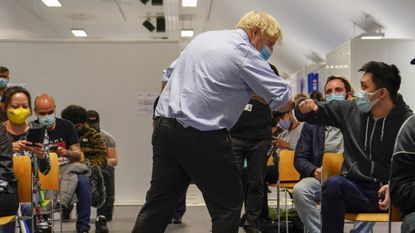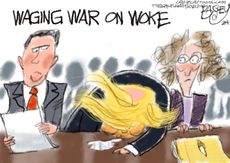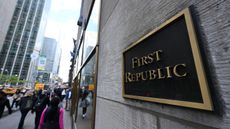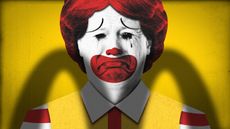Leaked government report reveals what post-Freedom Day restrictions could cost UK
England set to drop face masks and social distancing from 19 July

Retaining even the most lenient coronavirus restrictions after 19 July would have a devastating economic fallout, according to a leaked government impact assessment.
Politico’s London Playbook has seen slides and graphs presented to ministers that “lay bare the stark consequences for businesses” if face masks and other “non-pharmaceutical interventions” remain in place after the final step out of lockdown on so-called Freedom Day.
Some government scientists are calling for a continuation of certain restrictions, but Whitehall officials told the news site last night that the combination of “economic concerns” and “improving health data” mean Boris Johnson “is now looking at lifting almost all measures next month”.
Subscribe to The Week
Escape your echo chamber. Get the facts behind the news, plus analysis from multiple perspectives.

Sign up for The Week's Free Newsletters
From our morning news briefing to a weekly Good News Newsletter, get the best of The Week delivered directly to your inbox.
From our morning news briefing to a weekly Good News Newsletter, get the best of The Week delivered directly to your inbox.
High to low
According to the leaked findings of the government’s Events Research Programme (ERP), a “high intervention” scenario - where social distancing is scrapped, but mandatory face masks, attendance caps and bans on serving food and drink continue - would be “ruinous” for many businesses, London Playbook’s Alex Wickham reports.
Indoor seated venues were “projected to achieve just 59% of their 2019 turnover”, costing the events industry “around £4.88bn over the next year”, he continues. And indoor non-seated venues would see their income “plummet to just 37% of their 2019 turnover”.
The argument for a total lifting of lockdown measures has been further strengthened by low rates of coronavirus deaths and a slowdown in new cases, which have “boosted confidence that a sizeable summer wave can be avoided”, says The Times.
The prime minister is “increasingly optimistic” about going ahead with his plan to end one metre-plus social distancing and the “rule of six” on indoor gatherings as long as “current trends” continue, the paper reports. Nightclubs are also “expected to reopen” and “the limit on mass gatherings outdoors” will be scrapped too.
The mass reopening of shuttered venues is likely to come as even more of a relief to businesses in the wake of the ERP assessment findings. London Playbook’s Wickham says the leaked documents reveal that even a “medium” level of intervention, in which Covid certification and bans on serving alcohol remain in place, would have “extremely grim” results.
According to the projections, the events industry as a whole would achieve just 78% of its 2019 turnover, dropping to 71% and 48% for with indoor seated venues and indoor non-seated venues respectively.
Retaining “low intervention” measures - “with face masks listed as the only blanket rule” - would still have a “major” impact on businesses too, Wickham continues. The ERP experts predict that in this scenario, the events industry would reach just 82% of 2019 turnover, with indoor venues at 72% and indoor non-seated at 65%.
The assessment was based on information including the results of a survey of 3,810 adults. The poll found that all “interventions significantly decreased demand” for attending events, “with the exception of Covid testing, which actually boosts demand”.
A health official told Wickham that the government knows “how devastating restrictions have been for the live events industry”, adding: “We desperately want to see full theatres, music venues and stadiums and are working every day to achieve this.”
New normal
As well as ending social distancing and mandatory mask wearing, Johnson also plans to drop the recommendation for people to work from home, “leaving it to individuals and employers to make decisions for themselves”, The Times reports.
A “senior government source” told the paper that ministers want to “get as close to normal as possible” from 19 July and that the emphasis would be on “personal responsibility” rather than laws and regulations.
Ministers are feeling increasingly confident as Health Secretary Matt Hancock points to “very, very low” numbers of Covid deaths as proof that the swift rollout of vaccines is getting results. A cabinet source told the Daily Mail that “it’s all over, even if not everyone in government has realised it yet. The link between cases and deaths is broken.”
All the same, says Playbook’s Wickham, “we might be some way off ministers saying that publicly”.
“But it is definitely the case that the combination of deaths so far staying low and the evidence that the vaccine works on the Delta variant has improved the mood in Whitehall significantly, and means many ministers are now much more relaxed about the persistently rising case numbers,” he adds.
Create an account with the same email registered to your subscription to unlock access.
Sign up for Today's Best Articles in your inbox
A free daily email with the biggest news stories of the day – and the best features from TheWeek.com
-
 'Good riddance to the televised presidential debate'
'Good riddance to the televised presidential debate'Instant Opinion Opinion, comment and editorials of the day
By Harold Maass, The Week US Published
-
 Caitlin Clark the No. 1 pick in bullish WNBA Draft
Caitlin Clark the No. 1 pick in bullish WNBA DraftSpeed Read As expected, she went to the Indiana Fever
By Peter Weber, The Week US Published
-
 Today's political cartoons - April 16, 2024
Today's political cartoons - April 16, 2024Cartoons Tuesday's cartoons - sleepyhead, little people, and more
By The Week US Published
-
 The birth of the weekend: how workers won two days off
The birth of the weekend: how workers won two days offThe Explainer Since the 1960s, there has been talk of a four-day-week, and post-pandemic work patterns have strengthened those calls
By Chas Newkey-Burden, The Week UK Published
-
 Why household wealth took off during the pandemic
Why household wealth took off during the pandemicUnder The Radar The Covid-19 pandemic caused a lot of pain and hardship, but new research shows it also left most Americans wealthier
By Justin Klawans, The Week US Published
-
 Empty office buildings are blank slates to improve cities
Empty office buildings are blank slates to improve citiesSpeed Read The pandemic kept people home and now city buildings are vacant
By Devika Rao Published
-
 Inflation vs. deflation: which is worse for national economies?
Inflation vs. deflation: which is worse for national economies?Today's Big Question Lower prices may be good news for households but prolonged deflation is ‘terrible for the economy’
By The Week Staff Published
-
 The jobs most and least at risk of being replaced by AI
The jobs most and least at risk of being replaced by AIUnder the Radar AI could affect roughly 300 million full-time jobs if it reaches its full potential
By Keumars Afifi-Sabet Published
-
 First Republic: will UK banks survive unscathed?
First Republic: will UK banks survive unscathed?Under the Radar US shares dip after collapse of third regional bank, but experts say contagion to the UK is unlikely
By Arion McNicoll Published
-
 What’s happening at McDonald’s?
What’s happening at McDonald’s?Under the Radar Fast-food chain closed US offices and told staff to work from home while it announces job cuts
By Harriet Marsden Published
-
 America's 'cataclysmic' drop in college enrollment
America's 'cataclysmic' drop in college enrollmentToday's Big Question "The slide in the college-going rate since 2018 is the steepest on record"
By Peter Weber Published